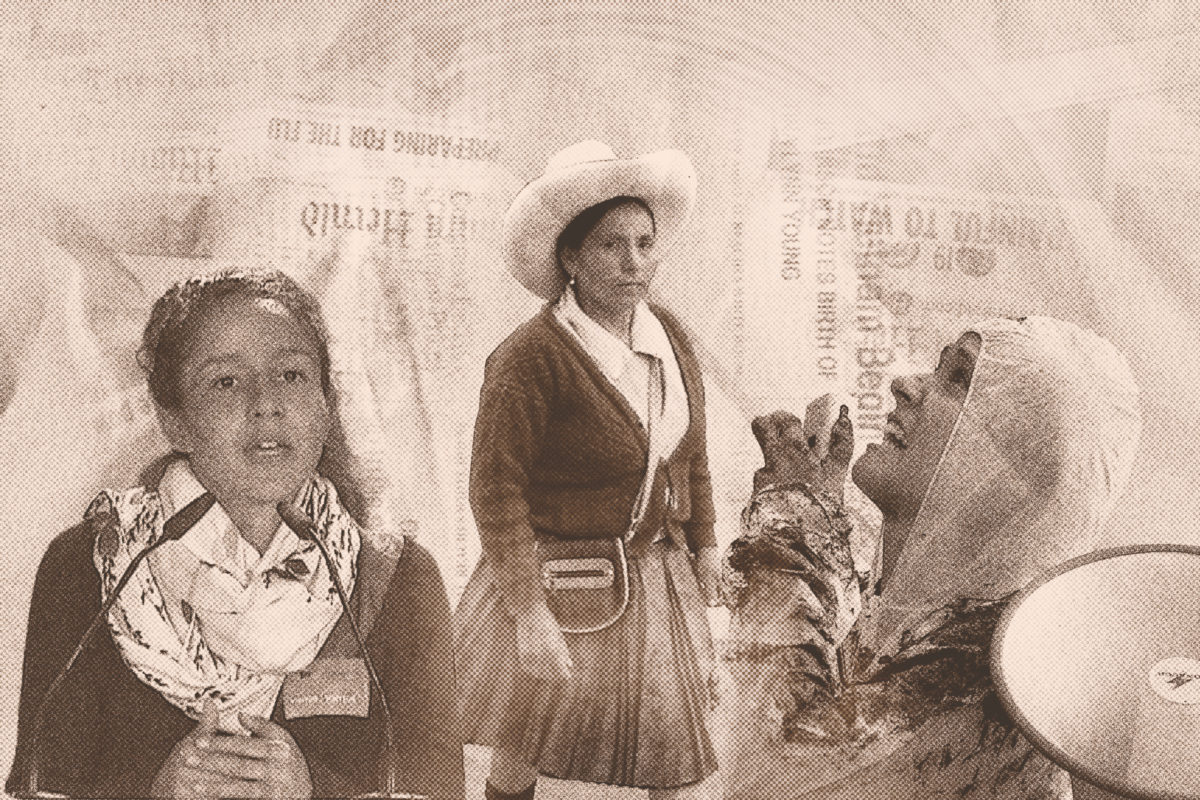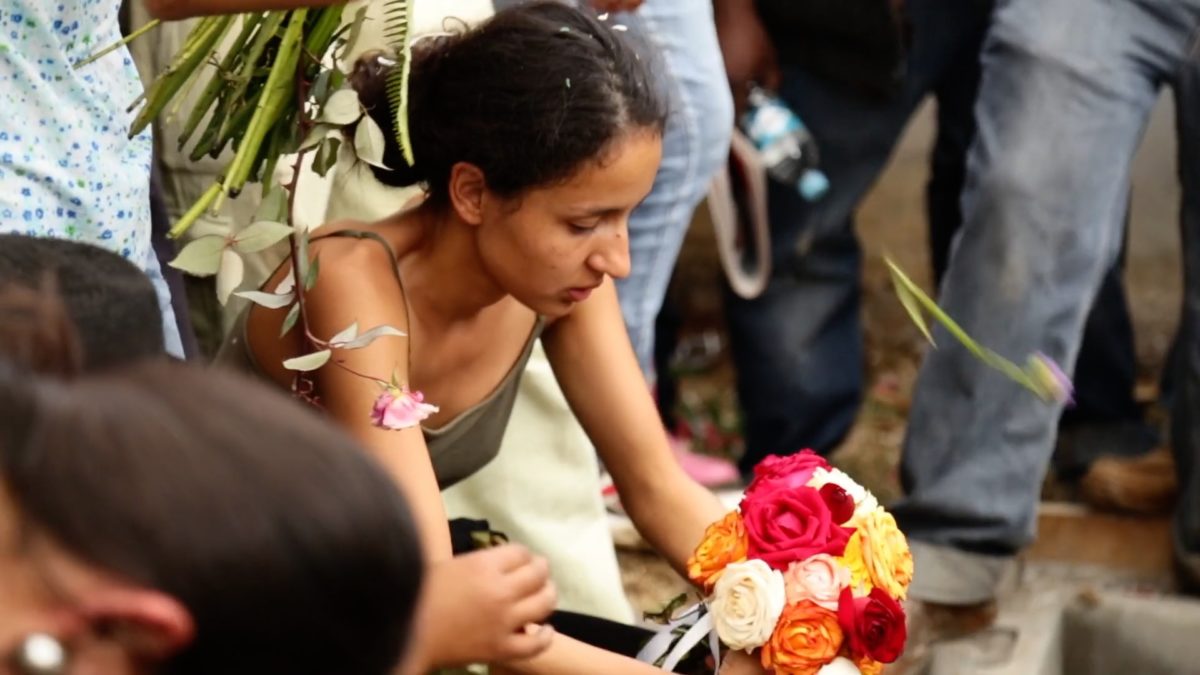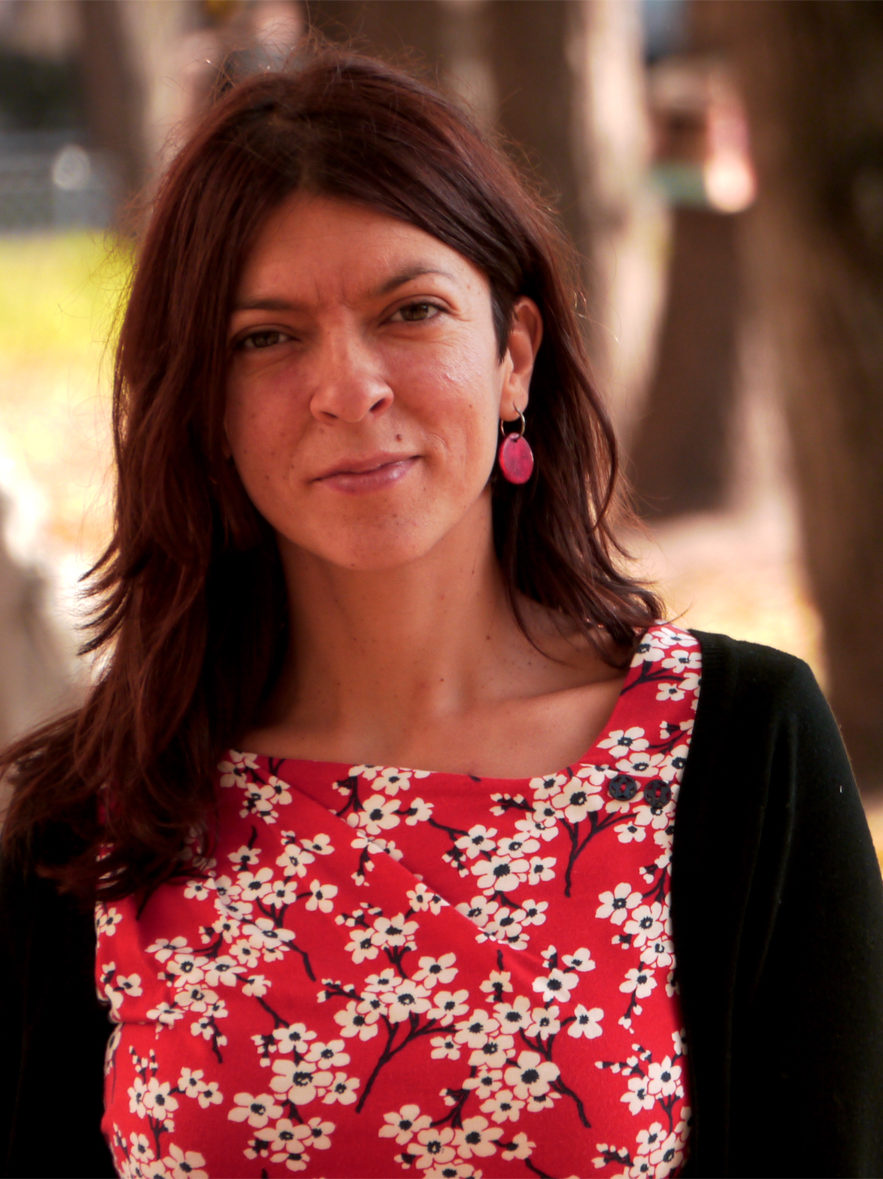Erika González, co-directed the documentary The Illusion of Abundance. The film features the struggles and determination of three women human and environmental rights defenders from Brazil, Honduras and Peru. CIDSE interviewed Erika to find out what motivated her to carry out this research around Latin America and to make this documentary.

Why did you choose to approach the struggles against corporate interests through the lens of women human and environmental rights defenders?
“First of all, I am from Latin America, which is a continent with many contrasts. We are very rich in natural resources, but at the same time we live in a place where we have hunger, corruption and misery. We wonder why we can’t exit this situation. I am making this film with Matthieu Lietaert (co-director) and we were both triggered by the book called “The open veins of Latin America” by Eduardo Galeano. Because 50 years after the publication of this book, which talks about more than 500 years of colonisation, we were wondering why, after such a long time, the situation had not changed. We still live in the same pattern: we continue to give our natural resources for the so-called “development of others”.
When I was working in Brussels following the relations between the European Union and Latin America, I saw many land defenders passing by our offices and talking about the impact of these relations on people and the environment in Latin America. This inspired us to have land defenders as protagonists, because they are the people who are paying the highest price. They are putting their lives at risk to defend their land, which often represents their home, the environment and, in general, the respect of human rights. Matthieu did some research. He went to several countries. We collected testimonies of women coming from Bolivia, Ecuador, Colombia and of course from the countries that, in the end, we decided to include in the documentary. I am a feminist, so for me it is very important to give a voice to women, in every aspect of our society, which we decided to also do in this documentary. Maxima (Peru), Carolina (Brazil) and Berta (Honduras) will be the protagonists of “The Illusion of abundance”.
What can we learn from the struggle of human and environmental rights defenders in Latin America by watching the documentary?
“Although our film is set in Latin America, the audience will understand that we are experiencing a global issue and that one of the root causes of the climate crisis is our economic model which is based on extractivism. In our documentary we want to show the cases of Maxima, Carolina and Berta because they respond to the same patterns. The “enemies”, the multinational corporations in these cases, arise and divide communities; they go to courts with an army of lawyers if necessary and, if the struggle is very big, they are ready to kill. With our film, we want to show all of this and want the audience to understand that we chose Peru, Honduras and Brazil, but that all land defenders worldwide experience the same situation. We want to show that there is a systemic way in which multinational corporations are acting.”
As a woman filmmaker, why do you think it’s important to tell and reflect on these stories?
“One very important and inspiring thing is the conviction of these three women. They are afraid, but their fear is not enough to keep them silent. They keep fighting and are globalising their struggle. We want to show in the film that everything is connected. If the problem is global, the solutions must be global too. Also, something that is not clearly seen in the film, but that we want to show in the debates, is the support of organisations like CIDSE. We are funded by 20 NGOs and organisations all over Europe. They play a key role in supporting local organisations that support defenders.”
Based on what you saw in your work, does corporate abuse have a differentiated impact on women in Latin America? And if so, in which ways?
“Yes, we saw this while filming and talking to land defenders in Latin America. Historically, women defenders don’t own land. Women own less than 20% of the world’s land, which is staggering given that they make up half of the world’s population.
Secondly, they have to fight a battle on two fronts: the public struggle to protect their land, water and our planet; and the often invisible struggle to defend the right to speak within their communities and families. So, these struggles involve both the public and private spheres. In Latin America, we still live in a very patriarchal system. Women have to stay at home to take care of the household.
Another shocking impact we found, was the sexual exploitation and prostitution. There are criminal networks that lure women and girls with false promises of employment in the mining companies. Women and girls are trapped in camps or nearby towns where they are exploited to “provide entertainment services to workers”. It is a problem that we discovered especially in Peru and Brazil, but it is present everywhere in Latin America where there are mining and extractivists projects.
Women defenders of the environment and their speeches are infantilized. For example, in Bertita’s case, she mentions that she was often mocked on social media and infantilised because of her physical appearance. People would also say that she was traumatised because her mother was killed when she was a child. In Carolina’s case, during company meetings of the Brazilian multinational Vale, she was often infantilised and discredited as well. People don’t treat women as adults, only because we are women.

Another issue that is discussed a lot around the world and that we often talk about in Latin America is Ecofeminism. It is about the relationship between the way men exploit Mother Earth, which they exploit and destroy, and the way men exploit women’s bodies. For example, Carolina has been abused and she talks about how women’s bodies are like the territory where she lives in. Like the land, they have been exploited for so many years.”
Is women’s leadership in the struggle against corporations ever rejected by men from their communities? What are the ways to avoid or overcome this?
“I think women have to fight twice as hard to have credibility. They have to fight more than a man just to be heard in their communities. I think this is a question for the protagonists, but I believe that the only solution that we have is to continue the struggle. All the women we portray in the film suffer from violence; violence is everywhere. We can see that it is extremely dangerous for them. They risk their life, but the courage that we have seen is very inspiring”.
From your observation and learnings during the making of this movie, what does it take to be a woman human rights and environmental defender in these challenging times? What inspired you the most?
“The high price to pay is very hard. We wanted to show this in the documentary: what it means to be a woman land defender. In the film, we also saw that it is something that you don’t really decide, but that you “become” because the situation is so extreme, so violent, so important. One day, they have to face these problems, but this is extremely dangerous. We wanted to show that even if there is fear, it can be overcome. Fear is like an engine, it is like a motivation to move and to fight. Also, the dignity that these women have was very inspiring to us. For example, in Maxima’s case, after winning her case in court, she received a letter from the corporation which wanted to buy her land. She refused even though they offered her $300,000. This is a huge amount which could have been used to pay for her grandchildren’s studies, but she is completely convinced of the need to protect the land. Maxima doesn’t want to live in another way.
I feel deeply inspired by the conviction of the need to protect the natural resources, the dignity and, above all, the courage that these three women share. They often receive threats. Bertita, for example, was attacked a few years ago. Carolina lives under threats. Maxima had an accident, one or two months ago, when she was on her way to court for a meeting with lawyers. Her family thinks that the only people who knew that she was leaving her village to have a meeting in court was the corporation. She’s in danger, the three of them are in danger.
Despite a deeply unbalanced game, these three women share a common goal: they are leading today’s fight against modern corporate conquistadors. Whereas governments and corporations are trapped in a global race to get the cheapest raw materials, Bertha, Carolina and Maxima tell us a story of tireless courage: how to keep fighting to protect nature when your life is at risk? When police repression, corporate harassment, injuries or even death threats are part of your daily routine?”
About Erika González

Before starting the co-direction of ‘The Illusion of Abundance’, Erika González was the managing director of a European Network of NGOs, Grupo Sur, from 2013 to 2017. She led the advocacy activities within the EU institutions, especially in the field of human rights with a focus on violence against women and feminicide. Grupo Sur, together with CIFCA, went on to become the EU-LAT Network. A feminist deeply committed to women’s rights, Erika is a senior journalist. For more than 15 years, she worked as correspondent for different EU and Latin America media covering EU affairs.
Photo: The Illusion of Abundance.

